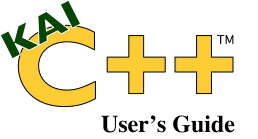
Table of Contents
- What is KAI C++?
- How to Use This Manual
- User's Guide Conventions
- How You Can Help Yourself
and Others
- License Managers
- Sample Compilation
- Overview
- Details
- Automatic Precompiled
Header Processing
- Manual Precompiled
Header Processing
- Other Ways for
Users to Control Precompiled Headers
- Organizing
Your Sources to Improve PCH Performance
- Using Higher-Level Abstractions
- KAI C++ Transformations
- Lightweight
Objects
- Inlining
- Branch Simplification
- Constant Folding
- Writing Optimizable Code
- Inline Functions
- Aliasing
- Aliasing in FORTRAN vs. C++
- Abstract
Float/Pointer
- Restrict Keyword
- Template Declaration vs.
Definition
- Automatic Template
Instantiation
- Explicit Inclusion
- Implicit Inclusion
- Ad Hoc Approach
- Prelinker
- Building Libraries
that Depend on Automatic Instantiation
- Shared Libraries
- Archives
- One Instantiation Per
Object
- Closing Libraries
- Building Libraries that
Do Not Depend on Automatic Instantiation
- Structuring
Code to Reduce Template Bloat
- Sharing via
Inheritance
- Sharing via
Global Functions
- Template Features
that are Deprecated or Removed
- Guiding Declarations
- Option
--split
Removed
- Parallel Prelinking
is Moot
- Other Template
Instantiation Modes
- Template
Instantiation Pragmas
- Command-line Options
- Keywords
- Pragmas
- Selecting a Debugger
- Compiling for Debugging
- Namespaces
- Compiling Pre-Namespace Codes
- Argument Dependent Name (Koenig) Lookup
- New Features for Templates
- Template Friend Declarations
- Default Arguments for Type
Templates
- Non-Type Template Parameters
for Function Templates
- Explicit
Instantiation of Templates
- Keyword typename
- Member templates
- ISO Syntax for
Full Specialization
- Partial
Specialization of Class Templates
- Partial Ordering of Function Templates
- Farewell to
Guiding Declarations
- Explicit Specification of Function Template Arguments
- Default Arguments Instantiated Only When Needed
- New-Style Casts
- Run-time Type Identification
(RTTI)
- Note for SGI Users
- Types Bool and Wchar_t
- New Features for Classes
- Mutable
- Definition of Nested Class OutSide Enclosing Scope
- Static Data Member Declarations
- Non-converting
Constructors
- Friend Definitions
- Covariant Return Types for Virtual Functions
- Class Name Injection
- Farewell to Friend Injection
- Array New and Delete
- New Features for Statements
- Declarations in Tested Conditions
- Scope of For-Loop Variable
- Return Void
- Literal Strings are Const
- Const and
Volatile Qualifiers Retained on Rvalues
- Linkage Specification is Part of Type
- Enum Bigger Than Int
- New Library Features
- I/O Streams
- Namespace rel_ops
- Traits for Characters
- Traits for Iterators
- Allocators
for Containers
- Template Class
stack
- Templatized
complex
- Templatized
Conversions Between
bitset and basic_string
- Changes in Template Class
valarray
- Changes in Template Class
auto_ptr
- Changes in Template Class
allocator
- Changes in Template Function
get_temporary_buffer
Next Section Copyright © 1996-1999. All
rights reserved.
E-Mail KAI Technical Support E-Mail KAI Contact KAI
This file last updated on 30 July 1999.
